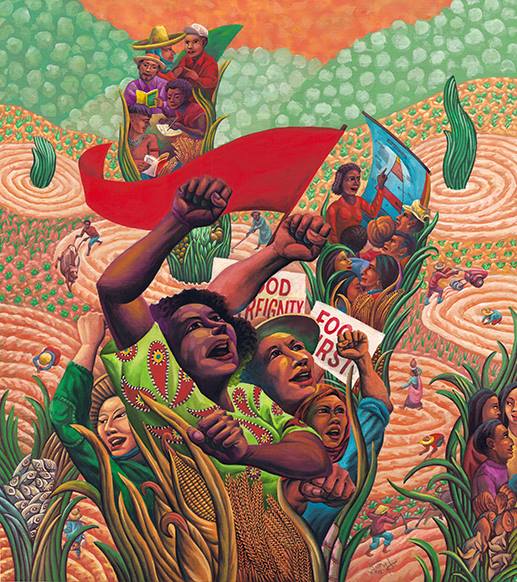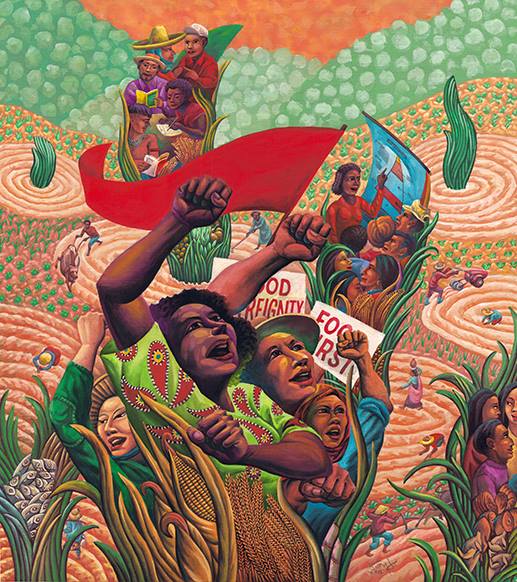Prof. Revelation Velunta, Union Theological Seminary, Cavite
Psalm 34:2-3, 16-23
Joshua 24:1-2, 15-17, 18
Ephesians 5:21-32
John 6:60-69
You are what you eat…
I think, therefore I am. Most of us know this famous dictum. My father-in-law argues that “I eat, therefore I am” is more applicable to Filipinos. Eating, like breathing, is fundamental to life. From childhood, most of us develop an intimate relationship with food. That is why it is so common to hear people say, “I love ice cream, I love crispy pata, I love pancit.”
These days, because of our collective stand on ending contractualization, we say, “I used to love Jolibee!”
Since the seminary has opened a Food Park, a Karen-Deria, that is designed to be healthy and affordable, we are thinking of naming food after people: Pork Eli-empo; Pakbet Iloc-Anno; Chicken Pork Adebbie; Ensaladang Paco-dan; Afrie-tada; Esfa-Sol Toquero; Maiz Connie Hielo; Lizette Pearl Coolers; Chicken So-Pascua; Sizzling Cle-Tofu; Pan del Rosario; and Baby Back Reeve.
Sadly, the majority of Filipinos survive on sardines and instant noodles every day. UNICEF reports that 30,000 children, five years old and younger, starve to death every single day. Actually, for billions of people in the world, God’s shalom is not peace on earth nor the end to all forms of violence and exploitation. For them, God’s shalom is a hot bowl of soup!
If we read our Bibles and pray every day, we will grow, grow, grow in the realization that almost every instance when people are hungry, when people are thirsty, when people are naked, strangers, sick, or imprisoned, we are challenged, no, we are commanded to give food, to offer drink, to clothe, to welcome, to visit, and to set free.
Historical Jesus Research tells us that life during the first century of the Common Era was very, very hard. The average life expectancy was 28. Fifteen percent of the population were day laborers. 90% were poor, the majority being farmers and fisher-folk. Poorer still were the dispossessed farmers and displaced fisher-folk, victims of the puppet monarchy’s infrastructure projects in honor of Augustus and Tiberius.
Human beings need at least 2000 calories a day to survive. Half of the population during Jesus’s time subsisted on 1000 calories per day. They were slowly, painfully starving to death. Maybe now, we understand better what the line in the Lord’s Prayer means: GIVE US TODAY, OUR DAILY BREAD.
This Sunday’s lectionary reading for the Gospel of John is about eating Jesus’s flesh and drinking his blood. This passage has been interpreted in so many different ways throughout the centuries. It serves as a basis for our Roman Catholic sisters and brothers’ theology of transubstantiation. Others call this John’s version of the Eucharistic ritual found in the latter part of the Synoptic Gospels. Others locate this as a part of the “I Am” discourses of the Johannine Jesus. There are those who argue that John 6 was added later, much like Chapter 21, to address the tension with the Jewish communities (thus the discussion on manna from heaven).
The Gospel of John declares, the Word became flesh and dwelt among us. God became human. In the fullness of time, God decided to become one of us. Oftentimes we say that the Gospel of John is the most spiritual of the gospels. We forget that many of its powerful metaphors are material, physical, and earthy: water; bread and fish; shepherds, sheep, and lambs; tears and death; wombs, births, and rebirths.
Now, we are commanded to eat the Word made flesh and drink his blood. And take and eat like manna, one day at a time. And we will live.
There are people whose daily lives revolve around coffee. There are those who cannot function well without rice. Then, there are those who share an intimate relationship with pan de sal and margarine, with mami and siopao, with San Miguel Beer and peanuts.
And there are those who are addicted to Jesus.
Loving, craving, eating Jesus on a daily basis, like manna, is dangerous. It is life-changing, transformative, and very, very risky! It requires giving up one’s life for another.
It means eventually becoming what you eat, being like Jesus—love in the flesh, food for the hungry, drink for the thirsty, clothing for the naked, a friend to the stranger and the sick, freedom to the captives, salt of the earth, light in the darkness, bread for the world.
To offer one’s “flesh and blood” is to offer the whole self. Jesus did. This is the path to abundant life for all. Self-giving. Offering “flesh and blood” so that others may live. And we, whom he calls his friends in the Gospel of John, are invited to do the same.
Sisters and brothers, people say, you are what you eat.
For those of us who call ourselves friends of Jesus, I pray we really are! Amen.##



 Psalm 34:2-3, 10-15
Psalm 34:2-3, 10-15